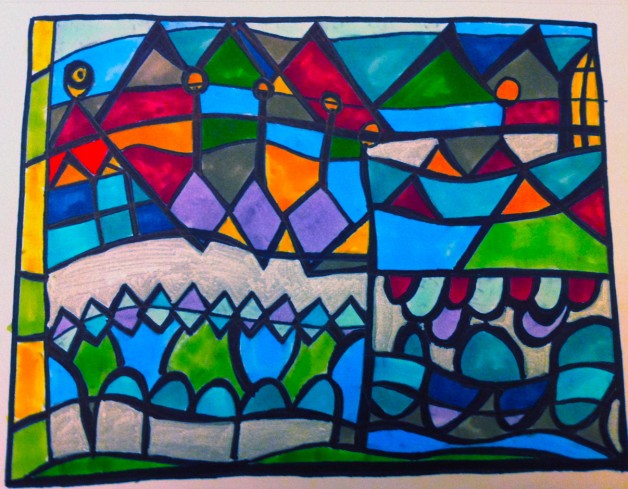
I am waiting for my writing group to get back to me on the latest overhaul of my novel-in-progress. It’s been a strange time. A half-vacation. Should I write something new? Clean my office? Go through my kids’ toys and get rid of things they don’t play with any more but with which they will instantly fall in love if I collect them in a box headed for the garage? Or do my taxes?
Well, some of all the above, and of course it’s only a half-vacation, maybe even a third-of-a-vacation, because I’m still teaching and coaching and, well, parenting. But for the first days of this semi-vacation, what I wasn’t doing was reading.
Oh, I was reading The New Yorker. But even there, I was starting with the movie reviews or leafing through a whole issue just to find the cartoons. (An aside: are The New Yorker cartoons getting sharper, more piercingly witty, or is it just that I am middle aged and so now I get them?)
Then a BWW member, Ericka Lutz, came out with her first novel, The Edge of Maybe. We had preordered a copy and it arrived in our mailbox the same day I fell sick. It seemed like a sign. I picked up the book and basically didn’t put it down for about seventeen hours, until I had read the whole thing.
My favorite thing about reading is that kind of obsessive falling into a book. Life feels more potent, more lived—and all I am doing is lying around, my eyes moving back and forth across the lines. Incidentally, writing a book every day offers the closest parallel to the experience of reading the story you are, in fact, writing. And why do we write but because we fell in love with reading long, long ago and somehow imagined that writing would be like reading only better, like 3D reading.
In the end, reading is more like reading than writing is like reading, though they both have their irreplaceable pleasures. As my semi-vacation draws to a close (I’ve made my way through Coetzee’s remarkable book Summertime and have begun Rushdie’s Midnight’s Children—spurred by my friend Becky’s remark that it’s won three Bookers and that she was going to re-read it), I look forward to having custody of my book again.
What was too painful in the beginning of this wait has now begun to fuel my reading: Other books offer themselves as examples to the writer, as reproach (here is what you are not doing), but also as inspiration (here is what you might do!). This last is the secret behind my Monday evening classes, in which we write spurred on by examples from fine and muscle-y writing, shaping our own content to the power of other people’s form.
What books currently inspire your writing?

Right now, Just Kids by Patti Smith. Our paths crossed umpteen years ago at Scribner’s, though she doesn’t/didn’t know me. She was just a little ahead of me, and a lot braver, but I know some of what she’s talking about. The book is great, and because she walked in NY while I was just getting my ears wet after college, it is very helpful to me for my book, even though my experiences were nothing like hers.
I just finished “The Art of Fielding” by Chad Harbach, and NYT Notable 100 last year. The intersection between baseball (which is part, but not all of this novel) and fine writing is very small – but this is a great story, with interesting characters than I cared about when I was reading. Couldn’t put it down.
Also have read recently:
The Leftovers, by Tom Perrotta (What happens in a small town after a Rapture-like event causes many, but not all of the town to disappear)
11/22/63, by Stephen King (What if you could go back in time to prevent the Kennedy assassination?) An amazing blend of historical fact and fiction. The man can plot.
Right now, I am in the middle of Murakami’s IQ84, which is very interesting, but where the heck is it going? Well, there are 750 more pages to go.
I have temporarily suspended reading “Little, Big” by John Crowley. It’s like trying to get to the middle of The Ancient Forest – the underbrush is getting thicker and thicker. I’ll need a machete if I return.
It’s so easy to get sucked into reading on-line blogs – but these books have been rewarding.
I love the idea of writing as a kind of 3-D reading.
I just finished Jennifer Egan’s A Visit From the Goon Squad, a reading experience so potent I almost felt as if I were writing (if only!). Angie suggested it for the chapter in which an uncle goes searching for his runaway niece in Naples, as I have a missing nephew/searching aunt in my book.
That part was interesting, as was how Egan plays with time. I love how she takes a minor character (a young African doing a warrior dance for the tourist), and told his life story (catapulting us into the future) in one dense paragraph. As you say, Elizabeth, books show us what we’re not doing but also what we might be able to do.